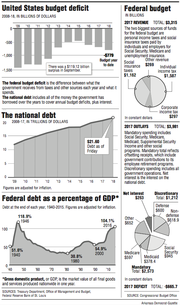WASHINGTON -- The annual federal budget deficit surged to $779 billion in fiscal 2018, its highest level in six years, as President Donald Trump's tax cuts caused the government to borrow more heavily in order to cover its spending.
On Monday, the Treasury Department said the annual deficit climbed by $113 billion compared with fiscal 2017. Debt will likely worsen in the coming years -- the Trump administration expects the deficit to top $1 trillion in 2019, nearly matching the $1.1 trillion imbalance from 2012.
The deficit grew because tax revenue is not keeping pace with government spending. Tax revenue was essentially flat in fiscal 2018, while spending in fiscal 2018 totaled $4.1 trillion, up 3.2 percent compared with a year earlier, as Congress spent more funds on military and domestic programs.
The government's fiscal year runs from Oct. 1 to Sept. 30. Receipts for the budget year ending Sept. 30 totaled $3.33 trillion, up less than ½ of 1 percent compared with fiscal 2017. While individual income tax collections rose 6 percent, from $1.59 trillion to $1.68 trillion, corporate tax collections fell 31 percent over the same 12 months, from $297 billion to $204.7 billion.
Federal revenue generally tumbled after December when Trump signed into law $1.5 trillion in tax cuts over the next decade. The tax cuts have caused economic growth to accelerate this year with Federal Reserve officials anticipating gross domestic product gains of 3.1 percent. While the Trump administration initially promised that the tax cuts would pay for themselves through stronger growth, analysts said there is no sign so far of that happening.
"The budget numbers make very clear that the faster growth isn't stopping the deficit from increasing," said Marc Goldwein, senior policy director for the Committee for a Responsible Federal Budget, a group that advocates for lower deficits.
Treasury Secretary Steve Mnuchin suggested in a statement that the underlying source of the widening deficit was growth in government spending, rather than the tax cuts.
"Going forward the President's economic policies that have stimulated strong economic growth, combined with proposals to cut wasteful spending, will lead America toward a sustainable financial path," Mnuchin said.
But William Gale, a senior fellow at the Brookings Institution, noted that the tax cuts are unlikely to generate a long-term bump in economic growth. More importantly, most estimates suggest that the deficit will worsen as spending on Social Security, Medicare and other programs increases with the aging baby boomer population.
The cost of financing the deficit has increased following Trump's tax cuts, with the interest charged on the 10-year U.S. Treasury note rising to roughly 3.15 percent from 2.46 percent at the start of the calendar year.
In July, the Trump administration revised upward its deficit estimates for coming years.
It projected the 2019 deficit will hit $1.09 trillion and will total $1.08 trillion in 2020 and $1.01 trillion in 2021 before once again dipping slightly below the $1 trillion mark in 2021 with a projected deficit of $952 billion.
Accumulating yearly budget deficits adds to the overall federal debt, which totaled $21.6 trillion as of Friday. That figure includes more than $5.6 trillion the government owes itself, including about $2.8 trillion borrowed from the Social Security Trust Fund, according to Treasury Department reports.
Information for this article was contributed by staff members of the Arkansas Democrat-Gazette.
A Section on 10/16/2018

